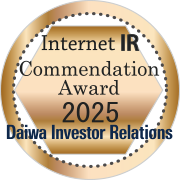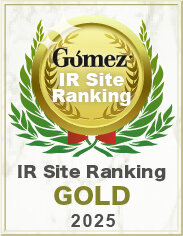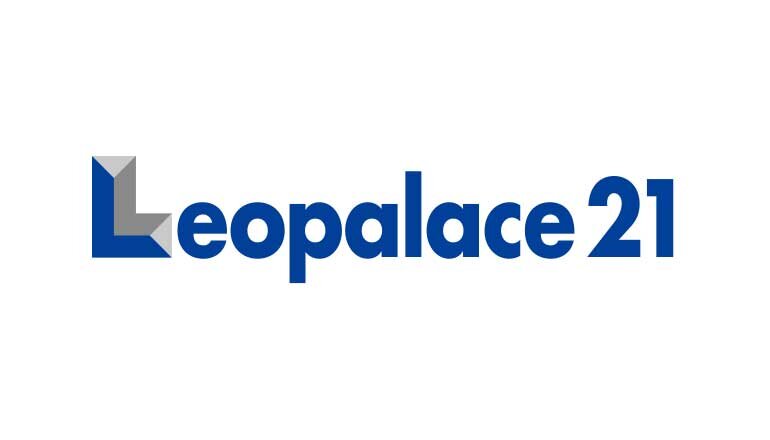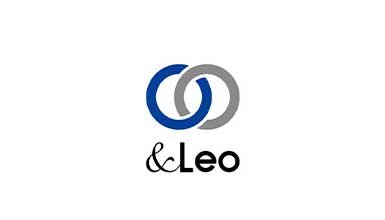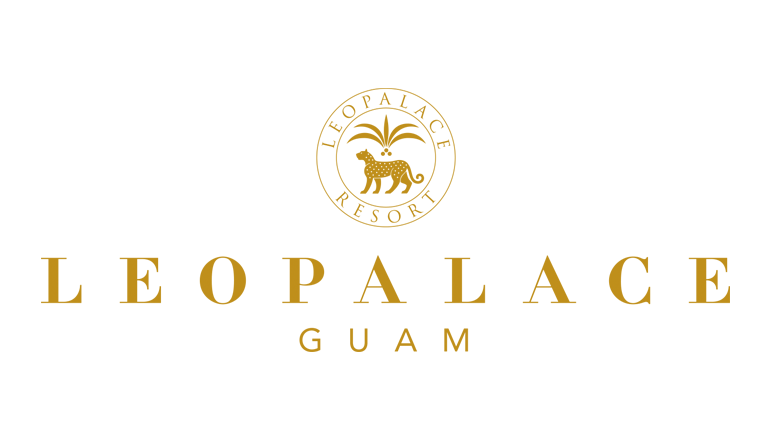- HOME
- Information for Investors
- IR Materials
- Integrated Report
- Message from the Chief of the Corporate Management Headquarters
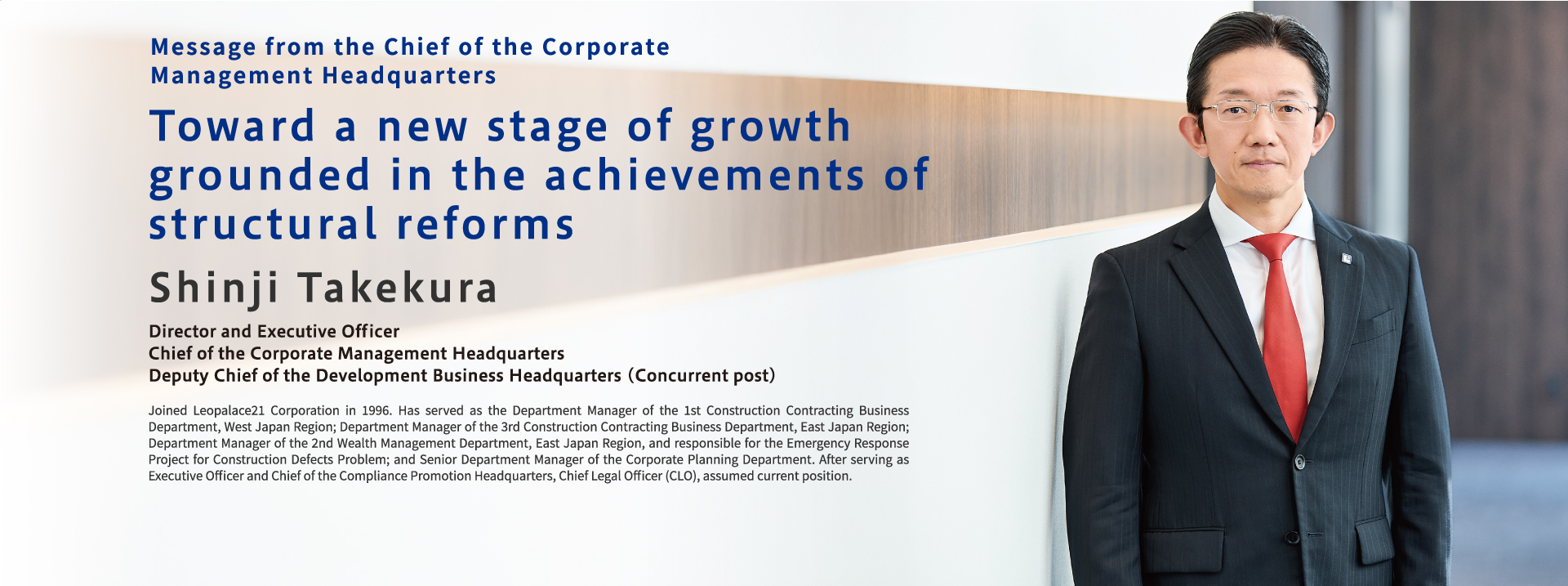
Looking back on fiscal year 2024
In fiscal year 2024, our business performance and handling of the construction defects problem proceeded according to plan. Looking back, however, I believe that even more than these, a number of events that were viewed positively by society made fiscal year 2024 an important turning point for our corporate reforms.
First, we changed our auditor to Ernst & Young ShinNihon LLC. To prepare for the firm's rigorous audits, we made thorough efforts throughout the year to improve our internal controls. Going beyond a financial perspective, we asked a consulting law firm to review our governance and compliance structure and worked to reinforce necessary elements.
The refinancing that we carried out in December 2023 relied on non-bank borrowing. Following the conclusion of repairs to obvious defects in December 2024, we executed full-scale refinancing through unsecured and non-guaranteed loans from Mizuho Bank in March 2025. Our contact at Mizuho Bank told us that they will make their judgment by looking at what the business contributes to society. Our company was recognized as a pillar supporting regional employment and revitalization by providing rooms for use as corporate-leased housing.
This series of events in fiscal year 2024 also represents the realization of progress in our governance and compliance, and I believe is of great significance to the building of a foundation to support our company's future.
| Previous consolidated fiscal year (FY2023) |
Consolidated fiscal year (FY2024) |
Change | Change (%) | |
|---|---|---|---|---|
| Net sales | 422,671 | 431,831 | +9,159 | +2.2% |
| Cost of sales | 353,836 | 354,537 | +700 | +0.2% |
| Gross profit (Gross profit ratio) |
68,835(16.3%) | 77,293(17.9%) | +8,458 | +12.3%(+1.6p) |
| Selling, general and administrative expenses |
45,521 | 48,062 | +2,541 | +5.6% |
| Operating profit (Operating profit ratio) |
23,313(5.5%) | 29,231(6.8%) | +5,917 | +25.4%(+1.3p) |
| EBITDA (Operating profit + depreciation and amortization expenses) |
27,974 | 32,734 | +4,759 | +17.0% |
| Recurring profit | 19,476 | 26,936 | +7,459 | +38.3% |
| Net income | 42,062 | 17,861 | -24,200 | -57.5% |
Shareholder returns and dividend payout
- Shareholder returns
-
Shareholder returns are a top priority for our management. Our Medium-Term Management Plan aims for a dividend payout ratio of 30% in fiscal year 2027, close to double the current payout ratio of 17.8%. Although the dividend yield is approximately 1.7%, which is not particularly high, we are committed to steadily increasing the dividend payout ratio to 30% or higher within a specified period.
The treasury stock TOB that we carried out in May 2025 was aimed at avoiding large-scale future dilution, as a responsibility to our shareholders. Our refinancing was also predicated on this TOB. At that time, there were opinions that we had sufficient funds on hand to repay our loan with no need for refinancing. However, it was expected that refinancing would yield the maximum amount possible under financial funding constraints and an amount aligned with capital on hand, and the refinancing was determined to be essential.
- Dividend payout and stock price
-
Because of the large amount of capital spent on the prevention of dilution during the fiscal year, the dividend was set to JPY 10. In the future, we will move step by step toward our target of a 30% dividend payout ratio for fiscal year 2027.
Our share price remained strong in fiscal year 2024, without the great fluctuations seen in fiscal year 2023. We will continue enhancing our corporate value to raise our share price valuation.
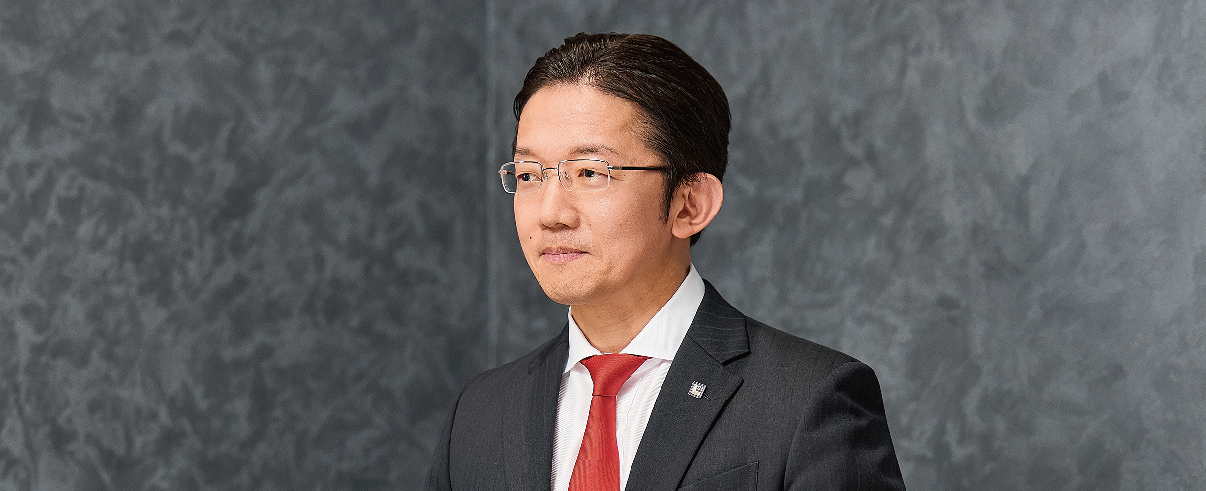
Fiscal year 2024 cash flow
EBITDA was JPY 32.7 billion, exceeding our forecast of over JPY 30 billion at the beginning of the fiscal year. In the Leasing Business, we grew sales through our price-focused strategy and created a base for the generation of a stable cash flow. We will channel these funds into shareholder returns, of course, as well as into the Development Business that holds a key to the Company's regrowth. We will also move forward with reviewing our capital structure.
As we refrained from investments for several years, our depreciation and amortization expenses have also been reduced and our financial structure can be characterized as lean and mean. Looking ahead, while further enhancing our risk sensitivity in terms of compliance and governance, we intend to undertake appropriate investments and generate the circulation of funds. We have finally entered a stage in which we can consider liquid investments, including in new businesses. In that sense, I believe that fiscal year 2024 was a year in which we laid a foundation for new growth.
| FY2020 | FY2021 | FY2022 | FY2023 | FY2024 | |
|---|---|---|---|---|---|
| Equity ratio (%) | -5.3 | 0.7 | 14.5 | 31.2 | 37.5 |
| Equity ratio (%) on a market value basis |
31.1 | 45.7 | 70.5 | 80.1 | 85.6 |
| Ratio of interest-bearing debt to cash flow (years) |
- | - | 3.0 | 1.4 | 1.2 |
| Interest coverage ratio | - | - | 2.4 | 5.2 | 14.9 |
Key management issues
- Construction defects problem
-
As of the end of 2024, 98% of obvious construction defects have been eliminated. We are addressing the remainder in coordination with specified administrative agencies, apartment owners, and tenants.
- Financial position
-
As noted above, we made the decision to prevent large-scale stock dilution through a TOB, while also undertaking the rebuilding of our financial position. We believe that over the coming year and a half, our capital structure will recover to a level close to that just before the TOB.
- Promotion of DX
-
Another issue for our management is optimizing the allocation of people, things, and money through DX. Our Leasing Business will soon arrive at a time when everything from searching through all properties to find a room to signing a contract can be completed via smartphone. We are constructing a system to bring this about as soon as possible, but currently have about 600 staff members working at counters in the Leasing Department. The promotion of DX will allow us to shift these human resources to higher added value domains.
The Leasing Management Department, which needs to conduct dealings locally, is a highly labor-intensive domain. To strengthen building security, we have installed security cameras and other equipment in our managed properties. We will also make use of these to carry out remote verification in some areas and will promote DX, particularly in area of customer dealings, to enhance work efficiency.
In setting prices under our price-focused strategy, too, we plan to construct mechanisms that leverage AI for further labor-saving and greater precision in price-setting.
Through such initiatives, we intend to enhance productivity and raise our operating profit per person from the current level of approximately JPY 7.5 million to the JPY 10 million level as early as possible.
Full-scale resumption of the Development Business
In fiscal year 2025, we changed the name of the Contracting Business Division to the Development Business Division and resumed the Development Business in earnest, with a focus on the rebuilding of existing apartment buildings. With an eye toward changes in demand structure 10 to 15 years ahead, we will tackle the restructuring of our managed properties portfolio.
One factor behind our decision to fully resume the business, despite some internal opinions that view the move as premature, is strong demand from owners. As a pioneer of subleasing through master leasing, we have provided numerous properties since around 1995. Because of our early start, a considerable number of these properties have reached the appropriate period for rebuilding. We perform maintenance on buildings for which materials and structures remain in good condition and work to maintain the property value. However, some owners desire early rebuilding for reasons of inheritance or other circumstances. Although the construction defects problem resulted in concerns among owners, our master lease contract won positive recognition and we have received many requests for rebuilding.
While we had generally contracted rebuilding work, in our relaunch of the business, we will adopt a new method by which, when contracting is difficult due to complex rights-related issues, we will acquire the land, perform development, and then sell the property. We have determined that this form of in-house development is also necessary for securing rooms to supply in high-demand areas and for optimizing our portfolio. As our Leasing Business faces exceedingly strong demand for newly built properties, engaging in rebuilding will help to strengthen the business.
For the first fiscal year, we plan to rebuild about 80 buildings with an order value of about JPY 10 billion. We consider our in-house systems for construction management and for collaboration with builders to be of utmost importance. While strengthening the systems, we plan to expand our rebuilding to about 250 buildings with an order value on the scale of JPY 32.0 billion in fiscal year 2027. Five years after that, we plan to again achieve our 2018 order value of about JPY 50.0 billion.
We have also laid out a system of multi-layered checking by our Architectual Engineering Department and the Construction Legal Team within the Compliance Promotion Department, and further undergo checks by external auditing bodies. Through this, we enforce thorough quality control and legal and regulatory compliance in our construction.
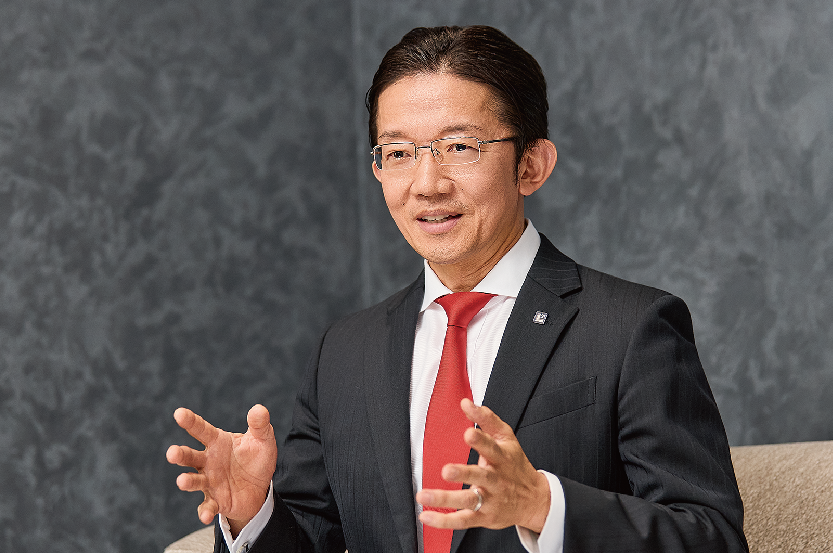
Outlook for management indices and growth scenarios
In the Leasing Business, the aging of properties is unavoidable. To achieve sustainable growth in the business, it is important that we construct a business model that maximizes profit in line with the Development Business.
There was a period during which we aimed for a high profit margin in the Development Business, but profit margins like those of the past will be difficult to attain in the future. However, our company is able to consider not only short-term gain from construction but also long-term profit from newly supplied properties in the Leasing Business. While conducting simulations of the effects of three-way integration among development, leasing, and management, we will build a structure that enables total and appropriate cycling of these.
We aim to achieve sales of approximately JPY 441.4 billion in fiscal year 2025 as well as sales of JPY 468.0 billion and EBITDA of JPY 43.3 billion in fiscal year 2027, the final year of our Medium-Term Management Plan.
for quarters, percentages indicate increases or decreases from the same quarter in the previous fiscal year.)
| Net sales | Recurring profit | Net income (loss) | Net income per share | ||||
|---|---|---|---|---|---|---|---|
| JPY million | % | JPY million | % | JPY million | % | JPY | |
| 2nd quarter (cumulative) | 219,500 | 1.5 | 17,100 | 2.2 | 3,400 | -67.9 | 9.89 |
| Full year | 441,400 | 2.2 | 30,900 | 14.7 | 11,600 | -35.1 | 35.06 |
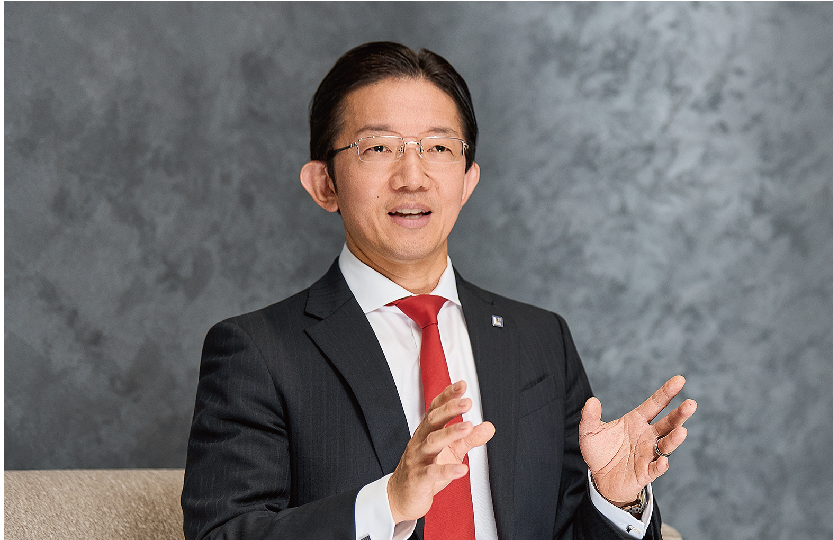
Two rebrandings
Our rebranding rests upon two pillars. One of these pillars is our in-house branding that began with the concept of "employee-centered." Our employees themselves formulated our MVVC and are currently working to instill new values within the Company. "Employee-centered" means more than simply placing the spotlight on employees. The concept calls for rigorous behavior under the idea of "everyone is a manager," with every employee acting autonomously and bearing responsibility for outcomes.
Achieving this requires that we hone the skills of our human resources. As we make improvements in terms of compliance and governance, we believe it is important that we continue to rigorously practice decision-making based on what is right, not on who is right, and that we engage in business impartially. Providing young people with opportunities directly connects to the sustainability of our company. We will prepare positions for human resources who are motivated and who are young but capable, fostering opportunities for them to take on personal challenges.
The other pillar is reestablishing and strengthening the
Leopalace21 brand outside of the Company.
"People never forget the room where it all began."
As conveyed in this message of our company, people retain a
strong impression of the room where they began living alone,
away from parents. Days spent in that room are filled with hopes.
As a company, we provide spaces that support the start of such
hope-filled lives. Looking ahead, we will serve as a cornerstone of
regional employment through leased housing for many
companies, and will more powerfully communicate internally and
externally our presence as a company that supports regional
revitalization and shoulders social infrastructure.
Our company, which had caused concerns to people, will survive as a result of these actions. I believe that we have arrived at our current situation, in which we are replenishing our economic capital, precisely because the societal role of our company has won recognition. By further building this societal recognition and continuing within society as a valuable company, I believe that we can attain even greater growth.
-
Page access ranking
January 1-31, 2026
-

Leopalace21 is working to solve a wide variety of social issues with the aim of creating a sustainable society under the sustainability vision of "We go on creating new value for society today and in the future."
SERVICE SITES
-
- Clicking the links above will take you to the home page of each site.
